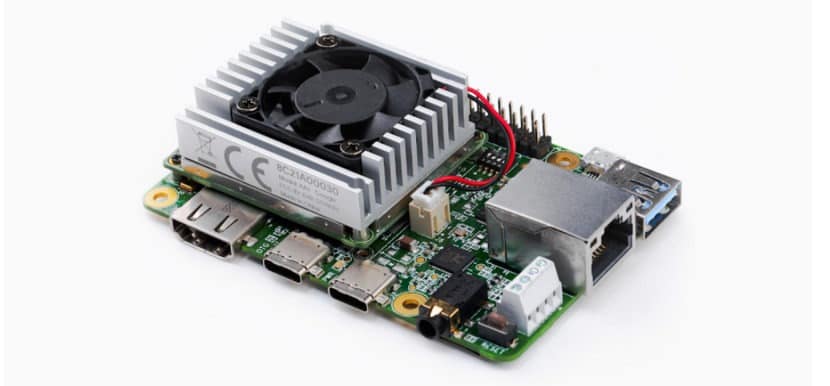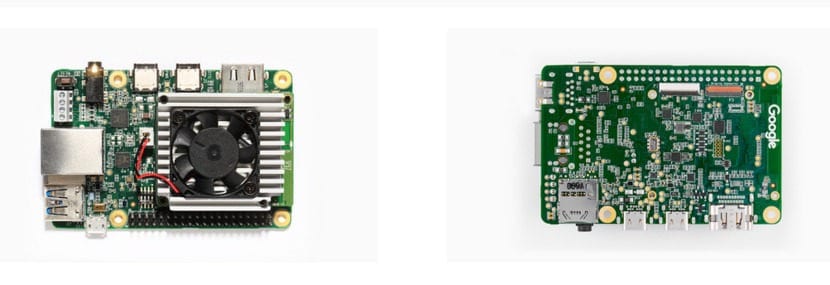
Coral Dev Board
When we talk about computers, everyone thinks of laptops or desktops. We don't usually take into account 10 ″ mini-laptops or, what we talk about most at HWLibre, boards like Raspberri Pi or Arduino. These boards, whose basic package includes nothing else, serve as the brain for practically anything, such as a multimedia center, a speedometer or a spy cam. But what if we need "more brain"? It seems that this is what Google has thought about when launching the Coral Dev Board.
What's the point of a new board if this market is dominated by Raspberry Pi and Arduino? More than we could think of at first. Today's boards are intended for use in devices whose tasks are common. Among these tasks we can have to run an operating system, as long as it is not a very heavy one. Operating systems, which I think is the most complicated thing existing boards can do, can be complex, but they are nothing compared to AI. The Coral Dev Board It has been created with Artificial Intelligence in mind, so that developers can carry out their projects in this field.
Coral Dev Board technical specifications
It only takes a glance to realize that the Coral Dev Board is not "a Google Raspberry." Why? Because the built-in fan is obvious to avoid overheating. In addition to this component, the largest by far, we have:
Edge TPU module
- CPU: NXP i.MX 8M SOC (quad Cortex-A53, Cortex-M4F).
- GPU: GC7000 Lite Graphics integrated.
- Accelerator ML: Google Edge TPU coprocessor.
- RAM: 1GB LPDDR4.
- Flash Memory: 8GB eMMC.
- Wireless connections: Wi-Fi 2 × 2 MIMO (802.11b / g / n / ac 2.4 / 5GHz) Bluetooth 4.1.
- Size: 48mm x 40mm x 5mm.
Baseboard
- MicroSD card slot.
- USB (2 ports): Type-C OTG Type-C power Type-A 3.0 host Micro-B serial console.
- LAN: Gigabit Ethernet port.
- Audio: 3.5mm jack with PDM digital microphone (x2).
- Video: HDMI 2.0a.
- GPIO: 3.3 V power rail 40 - 255 ohms programmable impedance ~ 82 mA maximum current.
- Power supply: 5V DC (USB Type-C)
- Size: 88mm x 60mm x 24mm
Reason for your price

Coral Baseboard
I think the price deserves a special section, even if it is short. Right now, if we go to Amazon we find the Raspberry Pi 3 Model B + for less than € 40. The Coral Dev Board is not yet available in other stores, it is only available in your official store, and its price is $ 149.99, about € 133 to change. The reason is simple: the Coral Dev Board does not play in the same league as Raspberry or Arduino. If we look at the RAM, some ports, etc, we might think so, but Google's new board has everything necessary for developers to use it for their Artificial Intelligence and ML (Machine Learning) projects.
The difference between what we can do between the Coral and other plates is that the Coral looks to the future, while the plates that we all know are the present. In that future there will be IoT devices (internet of things) in all corners of our house and outside of it and these devices will learn our habits to help us make any task faster, more efficient and easier. In short, make life more comfortable.
With Mendel operating system, based on Debian
Another of the positive points of this board is that it is not necessary to start projects from scratch. The "Coral Developer Board" (that's "Dev Board") includes support for TensorFlow Lite, models that can be compiled to run on the Coral Dev Board. The board comes with a full operating system installed, and this is another of its strengths for me. The operating system it includes is Mendel, a Debian-based operating system. If Debian doesn't sound like you, surely Ubuntu will sound like you, one of the most popular versions of Linux that is based on that Debian that for some is so unknown.
That it includes a Debian-based operating system means that you will be able to use all (or almost all) the tools that are available for Linux. In fact, Ubuntu is a very popular operating system among developers and everything that can be done with Ubuntu can be done with Mendel. As a Linux user, I can almost guarantee that among the few differences that Mendel users will find will be the user interface and where each click will have to be made.
Coral USB Accelerator: a brain connected by USB

Coral USB Accelerator
At the same time as the Dev Board, Google has also launched the Coral USB Accelerator. I think its price explains a bit the difference in price between the Coral Dev Board and the Raspberry Pi or Arduino. The USB Accelerator worth $ 74.99 and inside it has the most important of the Dev Board, that is, what we could call the brain that will allow us to create Artificial Intelligence and Machine Learning projects. If we add the nearly € 66 that the Raspberry Pi is worth to the € 40, we would already have about € 100, about € 30 less than the full board. Of course, we must bear in mind that with those € 30 we would already have the plate mounted. From this point of view and taking into account that the guarantee is given by Google, the price is at market level or just a little higher.
Aimed at developers
As the name implies, the Coral Dev Board and the USB Accelerator have been created with developers in mind. A normal user does not need those parts of the "brain" that allow to execute Artificial Intelligence or Machine Learning projects. I explain this because we should not get carried away by consumerism and buy a plate that we are going to waste if what we want is to create a multimedia center or a speedometer. In fact, I myself considered buying a Raspberri Pi for my own multimedia center, but for a little more, I bought a set-top box with Android TV, which offers me everything I need and much more.
On the other hand, and as with the rest of plates of this type, it must be taken into account that does not include any box to put it, so we will have to work with the loose board, create a box for it, wait for someone to sell accessories or a set that includes some type of support, power supply, etc., as Raspberry Pi does.
What do you think of the Coral Dev Board and its brother the USB Accelerator?